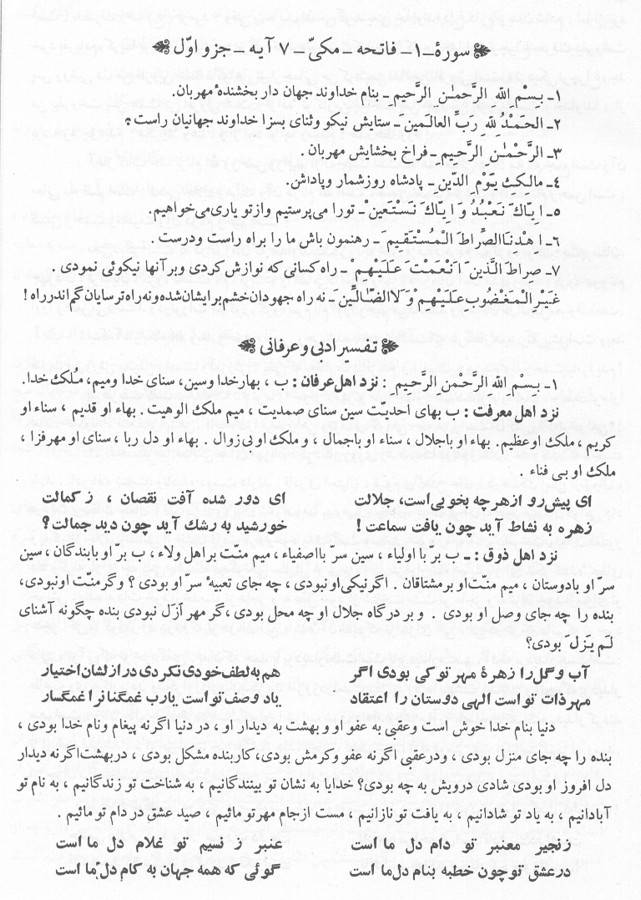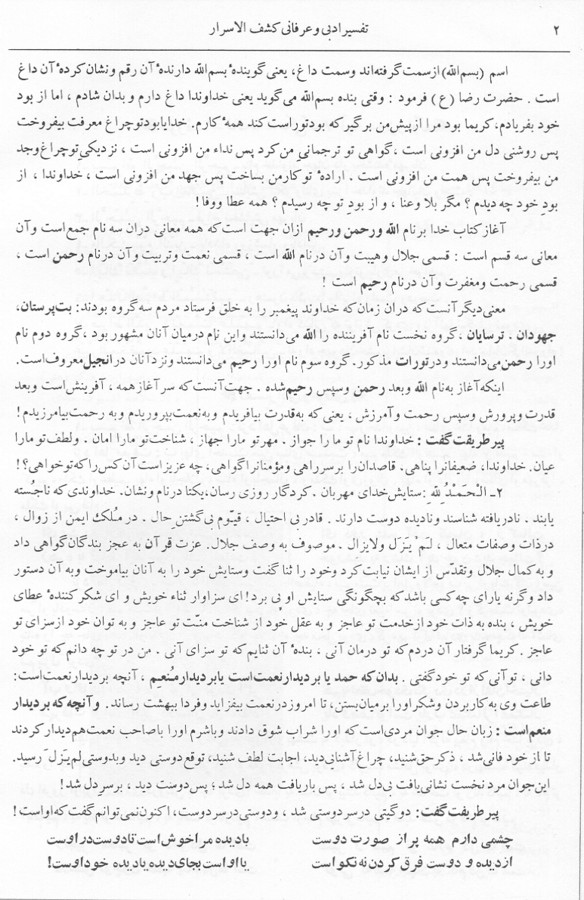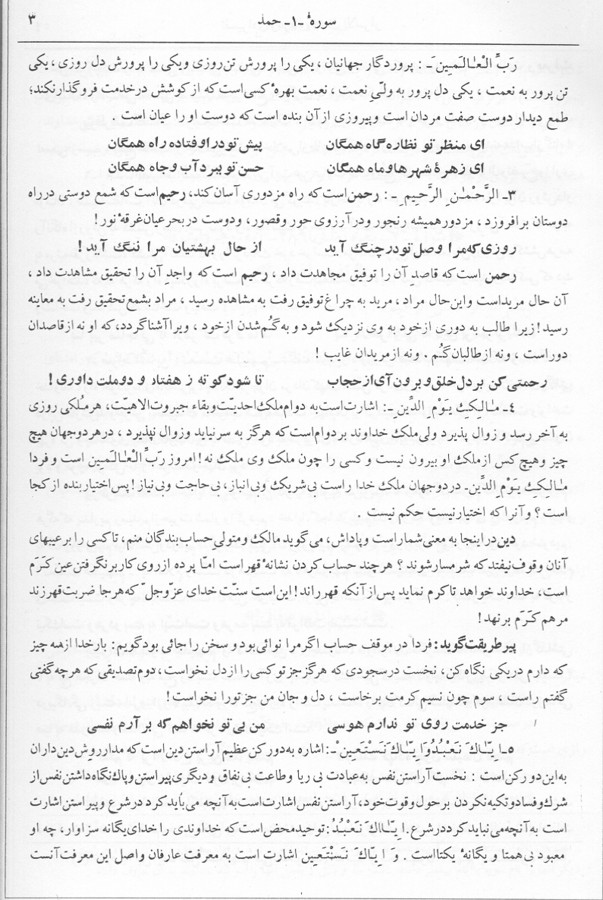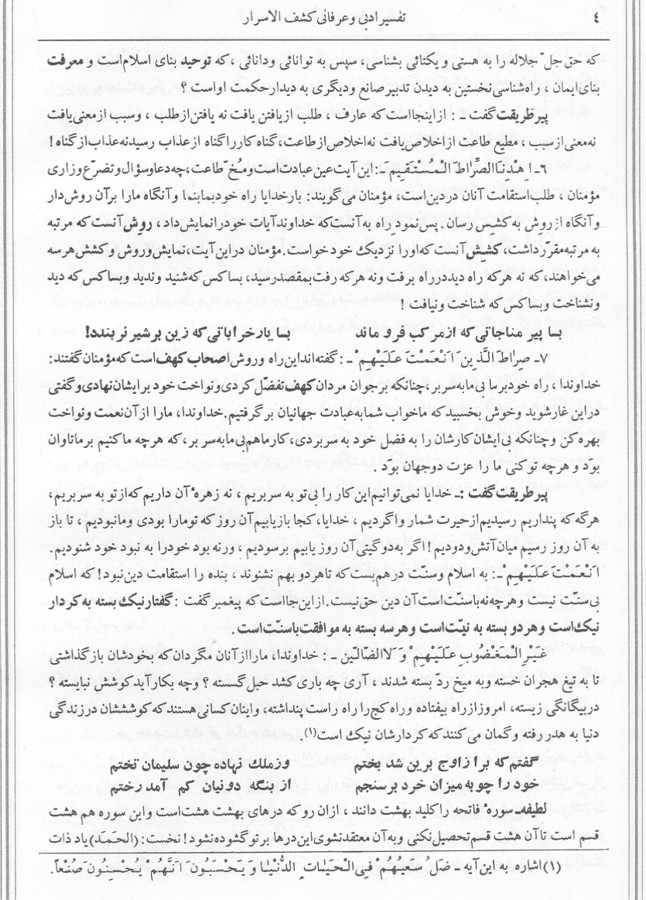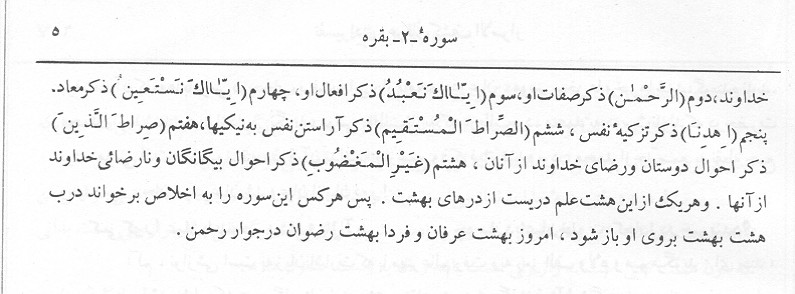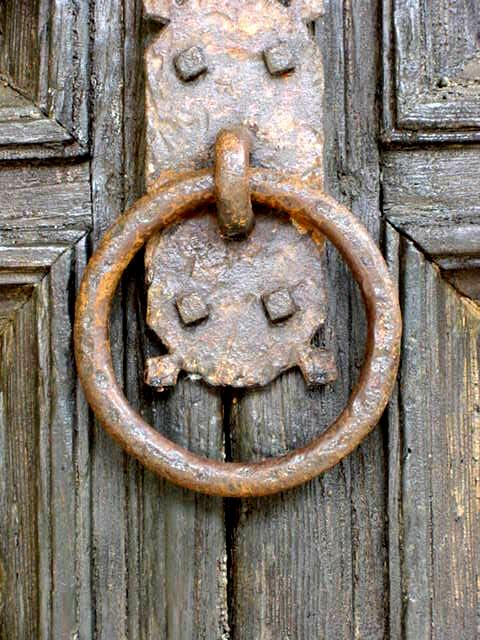
Kashfol Asraar (Unearthing
The Secrets)
Al-Fatiha (The Opening)
Makki (Makkan Period i.e. the
first 13 years of Divine Revelation in Makkah)
Chapter 1, 7 Verses
Discussion
Join
Lingual
Tafsir (Exegesis)
Bismi
Allahi alrrahmani alrraheemi
In the Name of Allah The Most
Beneficent The Most Merciful
Alhamdu
lillahi rabbi alAAalameena
The Praise For The Lord The
Universes
Alrrahmani
alrraheemi
The Most Beneficent The Most
Merciful
Maliki
yawmi alddeeni
The King Of The Day of
Recompense
Iyyaka
naAAbudu waiyyaka nastaAAeenu
You We Worship And You We Ask
For Help
Ihdina
alssirata almustaqeema
Guide Us To The Right Path
Sirata
allatheena anAAamta AAalayhim ghayri almaghdoobi AAalayhim wala
alddalleena
The Way Of Those On whom You
Have Bestowed Your Grace Not Of Those Who Earned Your Anger Nor Of
Those Who Went Astray
Adabi (Moral & Ethical) &
Irfani (Gnostic) Tafsir (Exegesis)
In The Name of Allah The Most
Beneficent The Most Merciful: In The Name of The Resplendent
Deity, In The Name of The Sublime & Effulgent Deity, In The Name of
The Regal Deity the owner of the Molk (Dominion). In The Name (made up)
of the Luminosity of the Ahadiat (Divine Oneness)
the Effulgence of Samadiat (Absoluteness & Needlessness) and the
Molk (Dominion) of ‘Uluhiyat (Divinity). (In ITs Name everything
exists, functions, destroyed and resurrected)
ITs Resplendence & Beauty
is Qadim (Time Immemorial & Preexistent); ITs Sublimity &
Effulgence Karim (Distinguished & Munificent); ITs Molk (Dominion)
‘Azim (Grandiose & Exalted).
ITs Resplendence Jalāl
(Momentous & Glorious); ITs Sublimity & Effulgence Jamāl
(Beautiful) and ITs Molk (Dominion) without Zawāl (Extinction &
Cessation).
ITs Resplendence the
heartthrob; ITs Sublimity & Effulgence evermore affectionate; ITs
Molk (Dominion) without Fanā (Evanescence).
Facing You
indeed all goodness is due to Your Exaltation (Jalāl)
Afar from
You plagued with scantiness of Your Perfection (Kamāl)
Venus was
vivified once heard Your acoustic (Samā’)
Sun burst
into tears once beheld Your beauty (Jamāl)
ITs devotion & charity for
Auliā (Divine Patricians & Nobles); ITs Serr (Secrets) entrusted to
Chosen & Pure ones; ITs benevolent bestowal upon the loved ones.
ITs Name for the slaves; ITs
Serr (Secrets) for ITs lovers; ITs bestowal for ITs yearners.
Q: If it was not for ITs
generous endowment, how could you be the Trustee for ITs Serr
(Secrets)?
Q: If it was not for ITs
benevolent bestowal, how could the slave ever find a way to reach IT?
Q: Could you ever have a place
in ITs courtyard of Jalāl (Momentous Glory)?
Q: If you were not the Lucent
Love of Azal (Sempiternity), how could you ever be cognizant of ITs
Lam-Yazal (Eternity & Everlastingness)? (Lam-Yazal means (IT)
Ceases Not! To exist)
The water
& mud what courage for Your Love ever
Could they
be in Sempiternity without Your Grace
The Love
from Your essence O Lord! Your lovers’ faith
The
remembrance of Your beauty the sorrower’s pain
(Water & mud refers to
human being. How can some mud to be so close the Beloved Creator?
Answer is that Beloved did something to that mud!)
Only with the Divine’s Name
this world is salubrious, wholesome & good; As is ITs forgiveness
for our end & judgment; And as is ITs meeting for Paradise. In this
world if there was no Name or Message of the Lord what place is it for
the subjects to live in? And if in the hereafter there were no Divine
forgiveness & generosity the subjects would have suffered
tremendously. In Paradise if there was no sight of ITs Divine Beauty,
setting afire our hearts, what happiness there for Dervishes?
Lord we see because of You;
Our life is due to Your Cognizance; Your Name nurtures & cultivates
us; Our beatitude Your remembrance; Our boasting is about finding You;
Drunken from the goblet of Your fervent love and we are the love’s prey
caught in Your trap.
Your
redolent chains the trap for our hearts
Fragrance
of Your breeze the enslaver of our hearts
In Your
love since the certificate indeed named for our hearts
As if the
entire universe dedicated to the happiness of our hearts
(Certificate is the
certificate of marriage. It really means the Divine Edict stating that
the Divine Love is for Mankind whether man wants or it not, feels it or
not)
“Name” in Arabic is “Esem” but
this word is derived from “Sima” which means sign or mark and its
derivative “Wasam” means to brand, stamp or mark as in the hot iron
branding the cattle. When the speaker says, “In The Name of Allah”
indicates s/he is branded as a slave or property for Allah. (Prior to
Prophet Mohammad people use to say “In The Name of so & so” either
the name of an idol or a noble person as indication of subjugation and
enslavement to them. They would do that in ceremonies like the
slaughter of the animals and that is why Allah commanded in Koran that
only ITs Mighty Names to be used commencing the slaughter of the
animals or any other act e.g. reading Koran or the start of the
prayers. To the Arab of that era that meant the establishment of the
regality of Allah as the ruler and rejections of all others, which was
a significant point of contention with the Prophet Peace Be Upon Him.
Today we are not sensitive about these issues, since acts are commenced
without mention of any names.)
The grandchild of the Prophet
Mohammad, Redha May Allah Be Pleased With Him has said, “When the slave
says “In The Name of Allah” means O Lord! I carry your hot iron-brand
and I am so fortunate & pleased. However I scream about my Self,
please the Benevolent One take me away from my Self since with you
(finally) all my affairs will be correct & fine. Lord your
Beingness lid the lamp of Ma’refat (Divine Gnosis) therefore do
increase the amplitude of light within my heart. Your witness to
my sins increases my prayers & invocations, nearness to Your Divine
Beingness has lit the lamp of my existence therefore my efforts are
multiplied. Your Will caused my actions and therefore my Johd (Struggle
& Effort) is increased. O Lord! What have I seen from my own
Beingness? Except afflictions & toil! What have I gained from Your
Beingness? Every endowment & fulfillment.”
The start of the Lord’s book
commences with, “In The Name of Allah the Most Beneficent The Most
Merciful” because all the meanings & concepts within this book can
be categorized in three:
1. Allah
(The Singleton Deity): Identifier of the Jalāl (Momentous Glory) &
Haiba (Affright & Awe)
2. Rahmān
(The Most Beneficent): Identifier of the Blessings & nurturing
3. Rahim
(The Most Merciful): Identifier of the Mercy & forgiveness
The other meaning is that the
Prophet Mohammad was sent to a nation comprised of three groups:
1.
Polytheists who used the name Allah for Creator and this name &
usage was common amongst them
2. Jews who
knew IT by the name Rahmān (The Most Beneficent) which was the name
mentioned in their Torah
3.
Christians who knew IT by the name Rahim (The Most Merciful) which was
the name mentioned in their Injil (Gospel)
Therefore the phrase for
commencement is the composite of Allah, Rahmān & Rahim to indicate
Beginning & Creation, Power & Nurturing, Mercy &
Forgiveness or the Lord saying, “I created with power, nurturing with
blessings, forgiving with mercy”.
Pir (Old Sage) of the Tariqat
(The Path) i.e. Ansāri said, “O Lord! Your Name is our passport. Your
Love is our dowry. Your Cognizance is our sanctuary. Your Grace is our
affluence. O Lord! You are the shelter for the weak, guiding the
Seekers on the Path and witness/acknowledgment for believers.
Infinitely endeared is the one You seek & want!?
The praise for the Lord:
Praise & Admiration for the affectionate Lord, the provider for all
needs, Nonpareil in ITs name & reputation. The deity that is found
without searching, is known without any cognition and loved without any
glancing. The Omnipotent that resorts to no tricks (due to no concerns
of efficiency). The Everlasting & The Eternal free of any transient
states (has no discernable states nor transitions). ITs Molk (Dominion)
safe from any destruction. ITs Essence & Attributes
indeed sublime & lofty, Lam-Yazal (Evanesces not) & Lā-Yazāl
(Ceases not, ceaselessly doing) and IT is described with the Sifat
(Attribute) of Jalāl (Momentous Glory). The greatness of Koran has
indeed acknowledged the weakness & helplessness of the slaves, ‘IT’
in Kamāl (Perfection) of Jalāl (Momentous Glory) & Qudus (Holiness
& Sanctity) appointed the human being as ITs deputy upon the earth,
IT celebrates ITs own Praise and taught ITs own praise & worship to
Mankind, issued a fiat demanding to be praised & worshipped
otherwise who could ever learn how to praise & worship IT?
O the One who deserves ITs own
Divine Praise and offers Divine gratitude for ITs own generosity &
munificence, the human slave due to the innate nature of his essence
can never serve You properly & deservedly, and his mind humiliated
recognizing Your blessings & bestowals, and if left to his own
devices never deserves any rewards from You. ('IT' is Divinely
Beautiful & Majestic and 'IT' is the One seeing ITself and 'IT' is
the one praising ITself and we are merely entangled within the act of
praises and think we are praising IT. IT is the one offering blessings
& munificence and IT is the one appreciating such bestowals and we
are merely entangled in between thinking we are offering gratitude to
IT. IT deserves great deeds and IT offers ITself great deeds and we are
merely entangled in between thinking we are doing great deeds for ITs
sake.)
O Benevolent One! I am ailing
with a pain that only You are its cure. I am the slave to that praise
which You deserve. What do you I know about You? Since You already know
everything. You are what You have told the universe about (i.e. we can
not find out anything about You unless You told us).
Know that Hamd (Praise) is
either upon seeing the blessing or upon seeing the blesser! Upon seeing
the blessing: Putting ITs obeisance to work and the lasso of ITs
gratitude around the waist, so that today increases the blessings and
tomorrow delivers you to the Paradise. Upon seeing the blesser: This is
the (thirsting) tongue of a brave man’s Halaa (Momentary States
of the Heart) served with the wine of Shawq (Anxious Yearning)
and this man accompanied with shame to meet the blesser to Fanā
(Evanesce) his Self. He heard about the Al-Haqq (Absolute & True
Reality), saw the lamp of cognizance, heard the acceptance of the
Divine Lotf (Grace), found the anticipation of friendship & love
and reached the loving of Lam-Yazal (Evanesces Not!).
This brave man at first saw a
trace of the Divine and lost his heart, then gained his braveness &
confidence then saw the Beloved that conquered his heart.
Pir (Old Sage) of the Tariqat
(Path) i.e. Ansāri said, “United in my mind are this world and the
world after, and the mind loves the loving but now… I have no idea who
this Beloved is?”
I have an
eye brim-filled with the face of my Beloved
I love to
see as long as within the eye is my Beloved
Not fair
to distinguish between the eye and my Beloved
Either IT
is the eye or the eye is none but my Beloved
The Lord (Sustainer &
Nurturer) of The Universes: The Lord the Divine Nurturer of the
entire universe, endued some with affluence and endued others with the
spiritual wealth, one his body was blessed and the other his heart was
blessed by being friend and close companion to the blesser of all
blessings. Those who ceaselessly strive hard to serve IT are profiteers
of the blessings. With insatiable desire & greed, yearning for
seeing IT is the attributes of the brave righteous men and the
triumphant is the slave that 'IT' BEHOLDS him:
Your
portrait the viewing pleasure for all
Towards
you lay the paths that were for all
O Venus
and the moon so brilliant for all
Your
beauty snatched what was there for all
The Most Beneficent The Most
Merciful: Truly Rahmān (Beneficent One) eased the path for
audacious expectations to receive blessings, but Rahim (Merciful One)
kindled the candle of Loving upon the path of the lovers, the audacious
takes for granted the blessings and expects castles and virgins of the
Paradise but the lover drown in the lights of the ocean of perception:
That day
when I grab hold of nearness to You
About the
Paradise ashamed I am facing You
(We desire for heavenly riches
but when we finally behold the Divine Beauty we are ashamed desiring
the Paradise because in comparison to that Beloved’s Beauty Eden is
nothing.)
Rahmān (Beneficent One) is the
Divine One granting success to ITs striving seeker, Rahim (Merciful
One) the Divine One granting the conscious soul the trueness of the
perception, first is the Morid (Seeker of the Divine) and the second
the Morād (Sought after by The Divine). Morid (Seeker) walked towards
the lamp of success and reached the perception, Morād (Sought after)
walked towards the candle of trueness enlightened by the Divine
Observation. Since the seeker nears IT only by losing the Self and thus
becoming cognizant of IT. IT is not absent from those who directly walk
towards IT (Qāsid), nor those who ask for IT (Tālib) and nor those who
are seeking IT (Morid).
Have mercy
upon the hearts and come out of the veils
How can
there be any judges to judge You in fairness?
(Asking the Divine Beloved to
come to view and why should IT not? There should be no fear of any
judges to misjudge ITs beauty as the Sublime above all else!?)
The King of the Day of Din
(Recompense): This is the Ishārat (Paradigm hinting) at the
continuance of the Molk (Dominion) of the Ahadiyat (Divine Oneness)
and the Baqā (Everlastingness) of the Omnipotent Ilāhiyat (Divinity).
Indeed every Molk (Dominion) shall end some day and Zawāl (Cease)
except the Divine Molk (Dominion) that shall never end or Zawāl
(Cease). In this world and the world after, no one or nothing is out of
the reign of ITs Molk (Dominion) and no king ever has any kingdom
similar to ITs!
Today 'IT' is the “The Lord of
The Universes” and tomorrow IT is the “The King of the Day of
Recompense”. In both worlds the Divine Molk (Dominion) has no
associates to help in ruling nor has needs of any kind, independent
& needless! So where is the slave’s authority? (Since there is no
need for authority) And if there is no authority then there is no
command.
The word Din in this verse
means to account for or to reward i.e. IT says I am the King and the
auditor of the slaves’ accounts so no one can find out about their
faults & shortcomings to cause them any shame!? Though the
recompense is the sign of subjugation & power yet the account is
veiled as a bestowal of benevolence & honor. Allah intends to be
generous right after IT subjugates and indeed this is the Divine Sunnah
(Tradition) i.e. if Allah Almighty hits hard almost immediately would
heal with ITs generosity.
Pir (Old Sage) of
Tariqat (Path) i.e. Ansāri said, “Tomorrow when facing my account (on
the Day of Judgment) if I have a voice these are the few words I would
say to my Lord: My Lord please look upon three things that I have 1) My
prostration that never yearned for anyone else 2) Acknowledgment that
whatever You said I accepted as truth 3) Once the breeze of Your
benevolence blew upon my heart, my love wanted no one other than You:
Other than
serving You have no other intent
Without
You I wish not to inhale a breath
You we (only) worship and You we
(only) ask for help: This is the Ishārat (Paradigm to hint) at
two foundations for the righteous people: First adorning the Nafs (Psyche)
with the Ibāda (Worship) free of menpleasing and obeisance free of
hypocrisy, second the cleansing the Nafs (Psyche)
from the Shirk (Polytheism), corruption and placing trust on other than
Allah. Adorning means to do what is due in Shariah (Divine Law) and
cleansing means to avoid what is forbidden in Shariah (Divine Law).
You we worship: This is the
absolute & unconditional Tawhid (Divine Oneness)
that is due deservedly for our Singular Lord, the Singleton Deity
Nonpareil Nonesuch One.
You we ask for help: This
is the Ishārat (Paradigm hinting) at a particular Ma’refat (Gnosis)
i.e. to be cognizant of the unique beingness of the Glorious Haqq
(Absolute & True Reality) followed by the cognizance of ITs
Omnipotence & Omniscience. Indeed Tawhid (Divine Oneness)
is the foundation of Islam and Ma’refat (Divine Gnosis) the foundation
of Imān (Faith). To find the way is first by beholding the Divine
Management of the Creator and second by beholding ITs Hekmah (Firm
Wisdom).
Pir (Old Sage) of the Tariqat
(Path) i.e. Ansāri has said, “Is here that the ‘Aref (Divine
Cognoscente) finds his ‘seeking’ and not seeking to find!? And finds
Sabab (causes & instruments) from the meanings not meanings from
the Sabab, finds obeisance from Ikhlās (sincerity & purity) not
Ikhlās from obeisance and finally the sinner finds sin amongst the
suffering not suffering amongst the sins!? (Wow! Dervish seeks the path
and that is wrong!? Dervish must seek what he is given by ‘IT’ and not
seeking to find something imaginary he desires or cooked up. If ‘IT’
showed the way or showed him the destination or gave him someone to
guide him then he follows what he was given. IT gives you a meaning
then you must use this meaning to find instruments & causes that
would fulfill the content of this meaning, not looking around what is
available and attempt to find some meaning in them, in and of
themselves they have no meanings. No matter how much you worship and no
matter how much you do charitable deeds no sincerity comes to you,
instead find your worships & charitable acts within the sincerity
IT already bestowed upon you. For example if IT gave you sincerity to
work with orphans and needy children then find your obeisance &
worship with them, but to be the CEO of a charitable organization shall
bring you nothing since IT did not give you sincerity as an executive.
Finally the sinful act of stealing in and of itself has no suffering
within! You can just go and remove an object without permission and no
harm comes to you. The suffering of that sin was already upon the thief
e.g. envious of what other people had or inability to be content or
work hard to acquire provisions. The torment and suffering of the sins
are prior to the act of the sinning not the other way around. So look
carefully where you are suffering, torments inflicted upon you by your
Self or by others and indeed that sufferance shall bring you sins.)
Guide us to the straight path:
This verse is the essence of Ibādah (Servitude, Serfdom & Worship)
and the core of the obeisance. Since the believers’ invocations,
moaning and sorrow are seeking the straightness upon the Din (Way of the Path) as they cry to their
Lord, “Lord show us the path
and place us upon that way
and then gravitate us
through this way towards Yourself.” Therefore showing the path is through the Divine
Manifestations of the signs, the way is the gradation of going
step-by-step and the gravitation
is ITs Will to want the slave closer to ITself. Believers, in this
verse, want all these three i.e. manifestation of the path, the way and the gravitation since not
everyone that saw the path went to it, and not everyone that walked on
the path reached the final destination. There are so many that heard but
did not see, so many that saw but did not recognize and so many that
recognized but did not find:
The old
worshipers that could not mount a mule indeed so many
The folk
from the tavern that mount a male lion indeed so many
The way of those on whom You have
bestowed Your grace: Some said this is the way of the “Companions of the
Cave”: “O Lord, let our path be traveled without ourselves, as You
generously decreed for the brave men of the Cave and showered them with
Your blessings. You told them to enter the cave and sleep well; You
preferred their sleep to that of the people’s worship (for several
hundred years!). O Lord bestow upon us such blessing and generosity,
let our affair reach its completeness without ourselves present since
whatsoever we do is a punishable crime against ourselves and what You
do for us the honor & greatness in both worlds.”
Pir (Old Sage) of the Tariqat
(Path) i.e. Ansāri said, “O Lord we can not complete our affair without
You, we have no courage to be with You since as soon as we suspect
reaching You the Hayrat (Bewilderment) pushes us back! Lord where can
we go for a day when You are all our affairs and we are nil! And up
until finding that day likens the smoldering between the flames and
smoke. If we find that day what a gain! Otherwise we prefer to hear our
nonbeing than that of our existence.
Bestowed Your grace: Islam
& Sunnah (Prophetic Tradition) were packaged together so the two
would not scatter (or be confused) since the slaves have no endurance
in the religion. Therefore Islam is not without Sunnah (Prophet
Tradition) and whatever way is without Sunnah (Prophetic Tradition) is
definitely not the true religion. As was confirmed by the Prophet peace
be upon him, “Good words are based upon good thoughts and the two are
based upon good intentions and the three are in concordance with the
Sunnah (Prophetic Tradition).” (The bestowed grace was the coupling of
the Sunnah (Prophetic Tradition) with the religion of Islam. Because
Mankind is weak and they would not be able to adhere to a pure religion
of dogma, beliefs and worships but they indeed would be able to carry
traditions e.g. Hajj or dietary or hygienic traditions and etc. These
traditions would keep the religion strong in spite of the followers’
weakness. And indeed this Sunnah (Prophetic Tradition) was the grace
bestowed upon the followers of Islam.)
Not of those who earned Your
Anger nor of those who went astray: O Lord do not place us amongst
those whom You left them to their own, those tired under the blade of
the Hajrān (Abandonment) and tied to the peg of denial. Yes! How could
a torn rope carry a load? What good is an effort spent on
un-necessities? Living like strangers, today fell off the path and
mistook the wrong way as the straight path, and these are the people
that their struggles & efforts wasted and all the way they thought
they were doing good, “Those whose
efforts have been wasted in this life, while they thought that they
were acquiring good by their works” (Koran [18:104]).
Latifah (Subtlety)
The Surah (Chapter) Fātiha
(The Opening) is believed to be the key to the paradise. Since there
are eight gates for Paradise and this chapter has eight sections,
unless you study & ponder upon these sections and do believe in
them the gates shall not be opened for you. These gates are as follows:
1. The
Praise (Hamd), Remembrance of the Divine Essence.
2. The
Beneficent One (Rahmān), Remembrance of Divine Sifat (Attributes)
3. “You we
(only) worship”, Remembrance of Divine Deeds & Actions
4. “You we
(only) ask for help”, Remembrance of returning to the Lord
5. “Guide
us”, Remembrance of cleansing of the Nafs (Psyche)
6. “The
straight path”, Remembrance of adorning the Nafs (Psyche)
with goodness
7. “The path
of those”, Remembrance of those befriending the Divine
8. “Not
those who earned Your anger”, Remembrance of those estranged and the
Lord dissatisfied with them.
Each one of these eight
knowledge(s) is a gate opening into the Paradise. Therefore the one
that reads this Surah (Chapter) with Ikhlās (Sincerity) the eight gates
of Paradise shall be wide open for him. Today the gardens of ‘Irfān
(Divine Gnosis) tomorrow the Gardens of Eden close to Ar-Rahmān (The
Most Beneficent)…
End.
©
2004-2002, Dara O. Shayda
